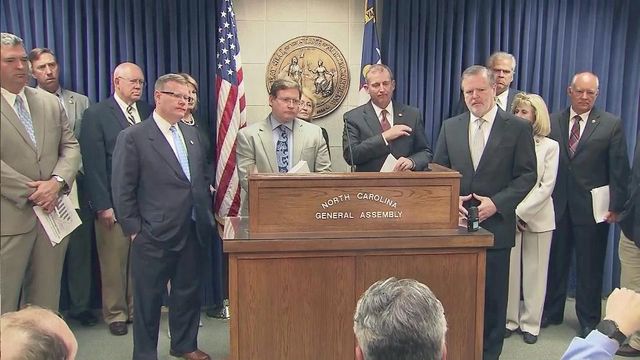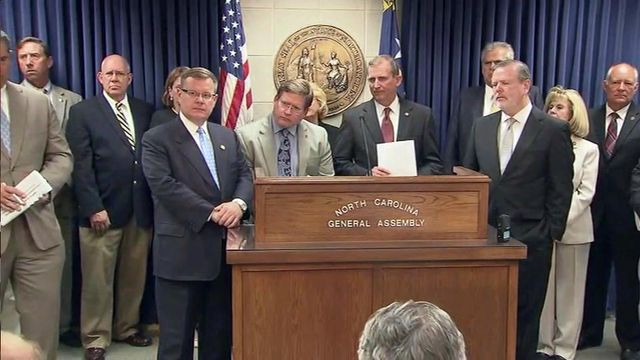State budget cuts income taxes, raises teacher and state worker salaries
House and Senate negotiators said Monday evening that they have reached a deal on a $22.34 billion state budget for the fiscal year that starts on Friday.
Posted — Updated"It continues the commitment made by Republican state leaders to dramatically raise teacher pay," Senate President Pro Tem Phil Berger said Monday night.
Although documents laying out the budget deal aren't expected to be available until close to midnight, Berger, House Speaker Tim Moore and other legislative leaders provided an overview during a 7 p.m. news conference. Overall, the budget represents a 2.8 percent increase in spending over the current fiscal year.
The final budget, they said, adopts a Senate plan to expand the personal exemption, income on which North Carolinians pay no taxes. For a couple who are married filing jointly, that personal exemption expands from $15,500 to $16,500 for the current tax year and then to $17,500 for the next tax year.
Meanwhile, the final budget looks more like the House proposal, granting salary increases to both teachers and state workers.
All state workers would get a 1.5 percent pay increase under the plan, plus a 0.5 percent bonus. The budget also sets aside a merit pay fund equivalent to 1 percent of state worker salaries that will be distributed based on performance.
"Some individuals will receive more than 1 percent; some will receive less than 1 percent," House Budget Chairman Nelson Dollar, R-Wake, said. "Those rules will be finalized and revised by the state Human Resources Commission."
State retirees will not get a cost of living increase, but instead will see a 1.6 percent one-time bonus. This is a compromise between House members, who wanted a cost of living increase, and Senators who said a permanent rise in pension benefits would be too costly.
Berger said he expected senators would take the first of two votes on the budget Tuesday. Moore said the House tentatively planned to vote on Thursday and Friday, but that schedule could move up to Wednesday and Thursday votes if Democrats agree to the change.
Presuming both chambers approve the budget, it would next go to Gov. Pat McCrory for his signature or veto. The new budget year starts Friday.
Here are other items included or otherwise settled by the state budget:
While the initial plan for a lower tuition rate had proved controversial, lawmakers said that several schools came to them asking to be part of the plan. The lower tuition, proponents say, will help shore up enrollment at less attended schools.
"I think the decision was that Elizabeth City State was the one that could benefit the most," Berger said.
Torbett said the budget includes money to repair ferries and to buy a new passenger ferry that will operate between Hatteras Island and Ocracoke Island.
"It's fine," Dollar said of the school's funding.
Rep. Chuck McGrady, R-Henderson, one of the House budget chairmen, said plans that would have relied on freshwater mussels or delayed cleanup dates have been taken out of the bill.
Dollar and Brown said the budget provides $20 million of the $30 million boost McCrory sought for mental health and substance abuse funding.
According to a news release, the budget also will use proceeds from the sale of the Dorothea Dix property in downtown Raleigh to pay for "services for the mentally ill, including $2 million to establish child facility-based crisis centers and $18 million to expand inpatient behavioral health beds targeting rural areas."
Related Topics
• Credits
Copyright 2024 by Capitol Broadcasting Company. All rights reserved. This material may not be published, broadcast, rewritten or redistributed.






